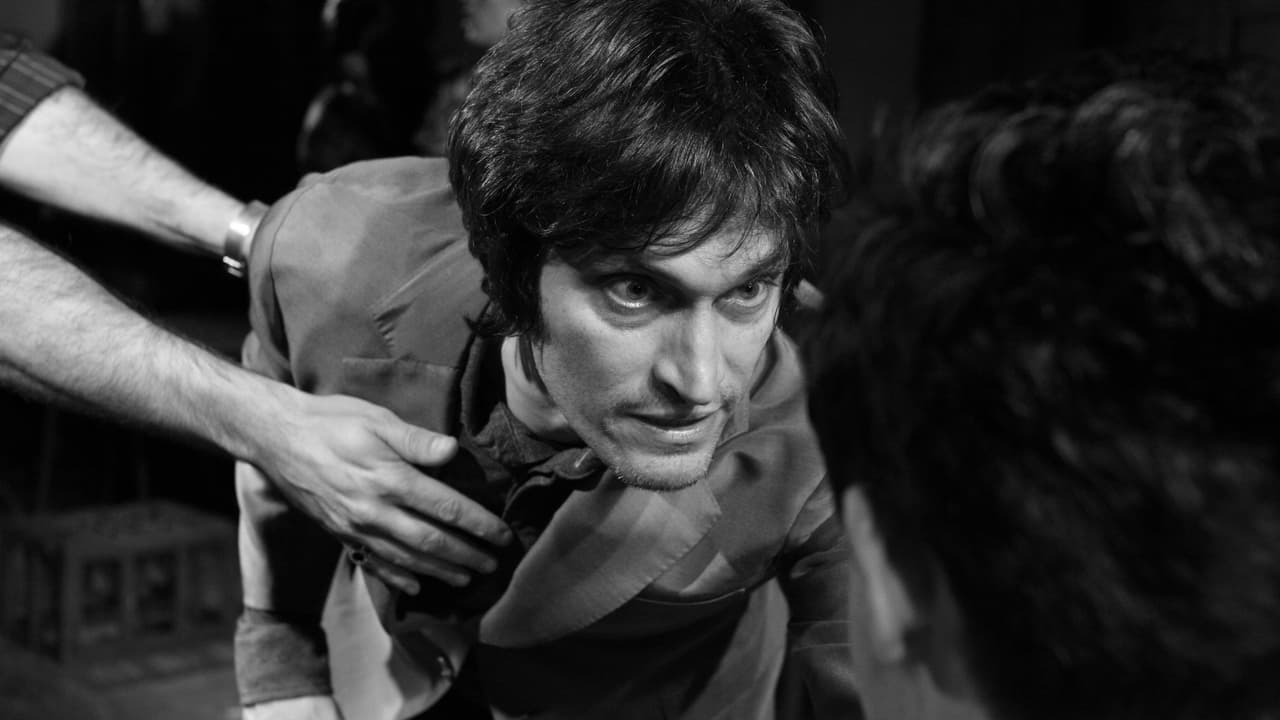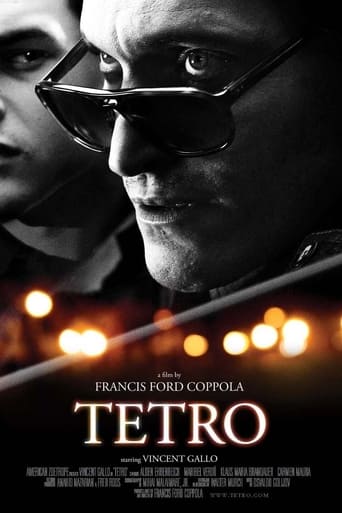

The performances transcend the film's tropes, grounding it in characters that feel more complete than this subgenre often produces.
... View MoreYour blood may run cold, but you now find yourself pinioned to the story.
... View MoreEasily the biggest piece of Right wing non sense propaganda I ever saw.
... View MoreIf you like to be scared, if you like to laugh, and if you like to learn a thing or two at the movies, this absolutely cannot be missed.
... View MoreDuring a lull in receipt of new movies at my local public library I found the BluRay of this movie on the shelves, begging for a viewing. I have found almost any recent movie on BluRay is worth seeing for the glorious picture and sound. This one fits the bill.It is set and 'filmed' digitally in beautiful Argentina, mostly in relatively high contrast B&W, with flashback scenes in full color. It works very well and looking back at my viewing experience I enjoyed the cinematography even more than the story.Yet the story is good, generally around old and new family dynamics. Set in early 2008, mid-40s Vincent Gallo is 40-ish Angelo Tetrocini, son of a famous musical conductor. He was a promising writer but left his American home and went off to Argentina where he no longer wrote. He doesn't want any connection to his family and has dropped his real name and goes only by 'Tetro'. If you look up the definition of 'tetro' you get " gloomy, sullen bleak, dismal, grim " and that pretty well characterizes Tetro. His younger brother is Alden Ehrenreich, about 18, as Bennie, about to turn 18. He has a job as a waiter on a cruise liner that has engine problems so he has a few days to look up Angie, his brother. But Tetro is not happy to see him, he makes that clear, but his wife urges Bennie to stay with them for the few days.Bennie discovers Tetro's unfinished manuscripts, which also infuriated Tetro when he found out. But they being all "unfinished" Bennie was determined to write an ending. he turned it into a stage play which became a contender at the May 2008 Patagonia festival.The movie is seldom fun to watch, well maybe the scene where Bennie, just having turned 18, is in a bathtub with two attractive young ladies. But it is a gripping drama and Gallo is ideal for the role.SPOILERS: The family dynamics were even more serious than we first knew, Bennis is not Tetro's brother, he is actually his son from a brief love affair when Tetro was 20. I'm still not sure why Tetro was rejecting even his own son but in the end it seems that there would be redemption for all.
... View MoreThe name of Francis Ford Coppola is always sufficient to make me want to see the movie. Having directed back in the 70s what are considered to be some of the best films in the history of cinema, Coppola seems to make esoteric choices in the last few years, exploring cinema and geographical territories (Argentina, Romania) a little aside from the main Hollywood track, enrolling international casts (and of course, almost no actor would lose an opportunity to work with him). Tetro seems to be his best film in the last decade, an American family saga set in South America, a drama that touches the artistic milieu and brings up hidden and murky family ties.On the way Coppola does not miss the opportunity to make music, ballet, opera in film. All the characters in the family are in the shade of an oppressive and egocentric father, obsessed with his career of world famous conductor (Klaus Maria Brandauer of whom I never have enough). The elder son (excellent acting from Vincent Gallo) is a playwright and lights director who has his own reasons to stop his artistic career, the younger character (Alden Ehrenreich reminding young Leonardo Di Caprio) starts as a steward apprentice to end as a stage director. Maribel Verdu as the elder brother's girlfriend completes a triangle of fine acting.All the action turns around family ties and secrets, around art as a goal in life and as an excuse for bad behavior. I am often complaining about the length of the American films (and not only American) and I will do it again, and again not because of the number of minutes by itself, but because the ten extra-minutes at the end turn the strong family drama into melodrama, and this seemed to me unnecessary.The cinematography signed by the young Romanian cinematographer Mihai Malaimare jr. The black and white colors used for most of the film with the colored flashbacks give a stylish and expressive touch to the viewing experience. Much of the charm and pleasure viewers have from watching this film derives from the camera work.
... View MoreI can see a lot of connection between Copolla's 1983 Rumble Fish and this 2009 Tetro. Firstly there's that same inky black monochrome that's as dark as night and with the occasional splash of colour. Then, there's the brotherly relationship, here between Vincent Gallo and Alden Ehrenreich.It's a while since I last watched Rumble Fish but the brothers there were Mickey Rourke (a rare good film for him at that time) and Matt Dillon. It's about street gangs and pool halls and how an older brother can be very impressionistic on a younger sibling. I'll say no more, except it's a blinder of a film and better than this.I would have to say that the monochrome cinematography here, though, that everybody drools over is just too dark and contrasty, for this subject and film. I'm a photographer, so hopefully know and whilst Rumble Fish looked superb, that was full of geometric angles and angular paradoxes. Here, the screen is often plunged into almost darkness much of the time.There is a balletic beauty to much of it though and we veer away from Rumble Fish and on to his works of epic greatness. The Godfathers and Apocalypse Now all share with this, an operatic build up of artistic and emotional tension that is mesmerising. Tetro has this toward the end at the Festival and we start anticipating something big and great. Do we get it? You'll have to see it yourself...Others have touched on the actual storyline and I'm going to leave that to them. That said, the cast are all good but oddly, Vincent Gallo, as Tetro seems to short-change us. Not performance wise but in that we just don't seem to get to know him, which is part of the whole story, of course. Clamming up into a shell is nature's way of protecting us, emotionally, which is what Tetro did - and still does.One major plus to this, very bog-standard DVD, was the sound quality - I 'felt' the sound as much as heard it. It prickled my eardrums with a tactile clarity, certainly Hi-fi standard, plus. OK, it was through separate amp and speakers but is as all my TV watching is.Is Tetro a film for you? That's a difficult one. Art-house cinema lovers probably will and those who like a drama that is quite complex also but those who want action and something akin to Apocalypse Now, no. It is long, visually rich and dark (like plain chocolate) and accordingly, not for everybody but for those who do, it holds many strengths.
... View MoreWhen two estranged brothers are reunited in Buenos Aires a story unfolds as truths are told, history revisited and the future rewritten. Glorious in it's black and white, Francis Ford Coppola has woven together a huge, operatic styled film with a beautiful, yet sad tale of family at it's heart.It is often breathtaking in it's imagery; light flickers across faces, each frame looks exquisite and the camera places itself at angles that give a entirely new perspective. Alden Ehrenrich is beautiful upon the screen and portrays the younger brother Bennie wonderfully. Older brother Tetro is aloof and almost mean and is actually well played by Vincent Gallo. Another great performance is by Maribel Verdu as the ever supportive woman in Tetro's life.The story is immense, and the past is gradually revealed and usually and at first oddly in contrasting colour. These flashbacks I found annoying because they were in colour, yet as the film progresses a touch of surrealism enters the film as flashbacks are told in colour but also in the form of dance adding to the operatic, theatrical feel the film gathers as it progresses. It is an amazing achievement, the dance sequences are beautiful and sublime. As is the film's score, at times the use of opera and classical pieces couldn't be more perfect and add a wonderful sense of feeling to the film. I was so throughally enraged by the film I could barely take my eye from the screen.It is rare that I come away from a film, wanting to see it again, but with Tetro I did. It is a film full of beauty, emotion and tragedy. One that tells a great story and does so with great visual style. Brilliant stuff More of my reviews at my site iheartfilms.weebly.com
... View More